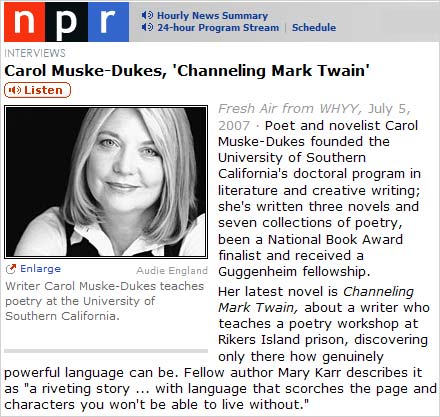
Rachel: Channeling Mark Twain is filled [with] multi-layered characters and topics from pimps and prostitution to mental illness and social activism. What made you decide to give the novel that title? Were you trying to direct the reader’s attention to one area of the book?
Carol Muske-Dukes: I couldn’t write this novel for years. I tried it as a long poem (I’m a poet) and as a kind of journalism, but no go. My difficulty in finding its center or nucleus was caused by a conflict I felt in my own life which colored my initial attempts to write this semi-autobiographical novel. The novel is set in a time I remember well. I was teaching poetry at the Women’s House of Detention on Riker’s [READ THE FULL INTERVIEW]


One often hears writers complain about book tours. Traveling constantly, facing small crowds, having the dream of the next book interrupted by the need to promote this one--it’s all too much... [FULL TEXT FROM LA TIMES]
WNYC - The Leonard Lopate Show: Channeling Mark Twain (July 31, 2007)

An interview,
quoted in its entirety, with Carol Muske-Dukes.
Publishers Weekly, June 18, 20001
Carol Muske-Dukes:
The Cruel Poetries of Life
Roger Gathman -- 6/18/01

"I like
the vocabularies of other disciplines." - Carol Muske-Dukes
If you go south
of Hollywood on LaBrea and turn east on
West 3rd Street, you will travel through the heart of
Hancock Park, an L.A. neighborhood built in the 1920s to
accommodate the needs of non-Hollywood nabobs, like the
Getty family. The street passes by massive English Tudor
mansions with odd Spanish Colonial addenda, a beautiful
golf course and occasional LaLa Land eccentricities (the
mini-villa, for instance, with the 17 life-size
reproductions of Michelangelo's David lining the
driveway). On this overcast May morning, the jacaranda
and magnolia trees are in full bloom along the side
streets.
Poet and novelist
Carol Muske-Dukes lives in the Windsor
Square section of this neighborhood, in a pied-ˆ-terre
that does not, as it happens, particularly allude to the
reign of King Henry VIII or the Spanish conquest of
Granada. Her dogs clamor at the gate when PW shows up,
but become a friendly welcoming committee when
Muske-Dukes appears.
This must be
an eerie season for the writer. On the
bright side, her latest book, Life After Death
(Forecasts, Apr. 23), an elegantly written novel of
manners, will surely be well received this summer. The
story centers on a St. Paul, Minn., woman, Boyd
Schaeffer, whose 42-year-old husband, Russell, drops dead
of a heart attack. She goes back into medicine and starts
an awkward romance with a funeral home director. The book
is full of marvelous throwaway pieces, prose poems of a
sort. Here's Freddy, Boyd and Russell's daughter, on the
playground with a book, after shooing away a playmate who
smells:
"Freddy
returns to her consideration of the tree and her
letters, safe in her milieu. To her right, near the
aquarium, grim, asthmatic Felicia batters pegs into
holes, wheezing and grunting. They are all in place, all
the categories and predictable social types that she will
meet and remeet throughout her life. The Aggressor
throwing blocks, the Whiner sobbing in his wet plast
pants, the Seducers, he and she tossing their curls, the
Good Citizen preparing to report to the Teacher."
Favorable criticism
might cast a retrospective glow of
interest over Muske-Dukes's two previous novels, Dear
Digby (Viking, 1989) and Saving St. Germ (Viking, 1993),
the last of which was a New York Times Notable Book of
the year. Both were published to critical acclaim, but
neither achieved more than modest popular success.
The dark side
is hinted at in the novel's dedication:
"For David, who gave me constant love and encouragement
in writing this book since 1994--and whom I lost on
October 9, 2000." "David" is David Coleman Dukes, her husband,
the actor who starred in television (The Winds of War),
theater (Bent) and film (The First Deadly Sin). After
Muske-Dukes had completed the book, her husband
unexpectedly suffered a heart attack and died. It was a
cruel coincidence, an instance of what Thomas Hardy
called "satires of circumstance," that Boyd's fictional
trauma was visited on her author.
Muske-Dukes
(who uses the simple "Muske" for her poetry)
has been a recognized figure in the literary world since
her first volume of poems, Camouflage, came out from
University of Pittsburgh Press in 1975. Since then her
poetry has garnered her major recognition in the poetry
world and the prizes and grants that go with it. She was
at the epicenter of the feminist surge in poetry in the
'70s and '80s. But her roots are in the tradition-bound
Great Plains.
Her grandfather
was "a Separator Man/ harvesting the
wheat/ in Wyndmere." Wyndmere is a town in North Dakota,
where her mother's family still owns land. "Back in the
Great Depression they were land rich, but poor. My mother
was a frustrated poet. She got a scholarship, but the
family couldn't afford to have her go to college. So she
married my father and had a family, but she always had a
great store of poetry she'd memorized. I remember she
would insert these asides into her bits, like 'Let me not
to the marriage of true minds--put your dishes in the
sink--admit impediments.' I remember it would puzzle me
coming upon these poems and thinking, hey, where's the
part about putting the dishes in the sink?"
More seriously,
Muske-Dukes appreciates the act of
memorizing poetry, which used to be a standard element of
the teaching curriculum, as a way of "embodying the
poem." "Joseph Brodsky," she says, "who was teaching
at
Columbia when I was also teaching there, used to have his
graduate students memorize poems. Brodsky was the kind of
poet who committed poems to heart naturally--he learned
English by memorizing poetry--out of great love."
"I became
one of those insufferable kids who are
encouraged to produce poems on all occasions" is the way
Muske-Dukes wryly sums up her early writerly drive. When
she went to Creighton, a Jesuit college in Nebraska, and
then to San Francisco State, she already knew, in a
sense, what she wanted to do. "I wasn't very hip when I
left Creighton. I just walked into the whole San
Francisco scene. I took a course in directed reading
under Kay Boyle. (You know, I like saying this whenever I
can. Kay Boyle should be part of the canon, along with
her modernist brothers.) I got my degree, went to Europe,
and even played in Hair in Paris. Then I went to live in
New York."
Muske-Dukes
wrote about the poetic and political moment
in New York in an autobiographical essay in her essay
collection, Women and Poetry: Truth, Autobiography, and
the Shape of the Self (1997): "When I arrived in New York
City in 1971, I joined consciousness-raising groups, but
I found it impossible to express my own sense of
conflict. I eventually sought out women in prison,
because their isolation and extremity reflected a
dislocation I felt in my own life and writing."
"I was
really inspired at San Francisco State by Kathleen
Fraser, who electrified me when she read Plath's
'Daddy,'" Muske-Duke says. "Fraser seemed to be able to
be both a poet and live an ordinary life. I didn't see
how I could do that myself. In addition to that, the
public world of poetry then was controlled by men--as it
still is. What I thought would help was teaching in the
Riker's Island prison, and so I was going between two
enclosed places--I was teaching at Columbia, and at
Riker's. Eventually I set up, through the National
Endowment for the Arts, a program for this, 'Art Without
Walls.'"
If her political
side was active at the time, her poetry
was also becoming known. "My first book was published
because I'd entered these poems in a contest. I didn't
win the contest--a Thomas Rabbit did. But they had enough
money, they could afford to publish two books, so they
published Camouflage."
In 1981, she
went to live in Italy on a Guggenheim grant,
and there she met David Coleman Dukes, in highly romantic
circumstances. "I rented a house in Barbarino Val d'Elsa,
outside of Florence. A beautiful house built into an
ancient Etruscan wall. My friend, Jorie Graham [the
poet], was in Italy then, too. Her mother, Beverly
Pepper, is world renowned for her heavy metal sculptures.
Her father, Bill, is an author and journalist. They own a
castle in Todi, which they built from ruins of a
12th-century fortification and tower, the Castella Torre
Olivola.
"Okay.
Jorie's brother, John, was an assistant director
on the television miniseries, The Winds of War, which was
shooting in Florence when I was there. Among the cast was
a friend of John's--David Coleman Dukes--who was coming over to
see John at his parents' place. Since Jorie had invited
me to come, too, the plan was that David would pick me up
in Florence and we would drive down there together. Of
course, it was a setup. We drove down there, and imagine
this place, with Beverly's sculptures surrounding the
grounds like brooding sentinels. Jorie and I talk about
poetry, John and David talk about acting. David was
trained as a Shakespearean actor, he knew the classical
repertoire, Moliere to Chekhov. Now, who wouldn't fall in
love in those circumstances?"
Muske-Dukes
shows me an album of photos of these places
she made for her sixth wedding anniversary. It ends with
a clip from Liz Smith's gossip column, announcing the
marriage of David Coleman Dukes and Carol Muske, and a news
picture of the bride and groom, looking radiantly happy.
In the early
'80s, Muske-Dukes was starting to write
fiction. Her first novel, Dear Digby, started as an
epistolary goof. "I was supposed to co-write that with a
friend, who was actually in the letters department at Ms.
magazine." The friend dropped out of the project, but
Muske-Dukes continued. "The letter format was really
helpful for me just starting out in fiction, because it
gave a natural flow to my chapters--you end a letter, or
you begin one, and that provides a way of swimming from
one piece of text to another." The novel is about a
Lonely Hearts-style columnist at SIS, a feminist
magazine. Digby radiates a sort of combination of the
ingenue humor of Gracie Allen and the in-your-face
feminism of the early Gloria Steinem. "I didn't have an
agent at the time. A friend showed the manuscript to
Viking, and they bought it. So I scrambled to find an
agent." The book was received with critical enthusiasm
and optioned, by Michelle Pfeiffer, for a movie. "It was
green-lighted by Orion, but they couldn't get their
screenplay together. At one point Callie Khouri--who
later did Thelma and Louise--wanted to do it, but they
turned her down." Her second novel, Saving St. Germ, in
1993, reflected her move to Southern California. By this
time, she was teaching creative writing at USC, in the
same department as T. C. Boyle. The novel is about a
scientist, Esme Charbonneau, who makes a brilliant but
highly technical discovery in physics.
'That novel
came out of reading a very beautiful novel by
Charles Baxter, First Light. I fell in love with that
book, which is about a woman who is an astrophysicist,
who has a deaf child. Baxter is great at showing how the
child enters the world in a different way that really
captured my imagination. I knew I couldn't just cop his
idea, but I decided I'd write about a chemist who wants
to be a cosmologist." That she would have to use a whole
different vocabulary did not seem daunting. "I like the
vocabularies of other disciplines. I had an interesting
experience when I was researching this book, because I
went to a scientist at USC with various questions, and
before he explained things to me, he asked me, what level
of calculus do you have? Or trigonometry? Or algebra? And
I kept shaking my head. So he said, I'm going to have to
use lay language? And it turned out that when he used
'lay' language, he started giving me metaphors and
analogies--as you would get, notoriously, in poetry." In
the book, Esme's life comes apart as she tries to develop
a purely theoretical insight into the origin of the
universe. "I got some odd reactions to that book. A
scientist from San Diego told me that I was doing a
disservice to women in science by showing this woman as
unstable. I tried to explain that it was fiction." Saving
St. Germ was also published by Viking.
Her current
novel was inspired by Evelyn Waugh's The
Loved One. "I thought I might do something in a comic
vein like that. So in St. Paul, I talked to funeral home
directors. But the satiric impulse in the novel petered
out as I got more interested in Boyd. Now that David has
died, I have more perspective on her. I think maybe I
didn't allow Boyd to be as shocked--as traumatized--as
she would have been. This novel had nothing to do with
David. He was pyrotechnically active, and you simply
wouldn't have suspected that he had advanced coronary
artery disease."
She has nothing
but praise for her new publisher, Random
House, who will also be publishing her book of essays,
Married to the Icepick Killer: A Poet in Hollywood, next
year. She likes it that her editor there, Daniel Menaker,
is an author himself. When Random House took her novel,
she was between agents. On the recommendation of Menaker,
she went to Molly Friedrich, who has "been more than
good, she's been a source of strength, a real friend."
Muske-Dukes is also pleased with the look of the novel,
which features, on its cover, a reproduction of a
painting by the Flemish master Joachim Patinir, Charon
Crossing the Styx, showing a gigantic ferryman of death
steering a pale, dwindled, suppliant figure across a
glassy sheet of water to a shore upon which a signal
fire, or funeral pyre, has been lit. The painting
complements not only this novel, with its subtly woven
tension between the transitions of everyday life and the
aura of myth, but also the striving in her work to
understand the emotional tug produced by the stubborn
particularity, the finitude, of objects and persons. As
she put it in a poem in Red Trousseau: The rest of it,
you see,/ is my work: slowing the mind's quick progress/
from the hypnotic of that startled world/ to the empty
solicitation of metaphor/ the loathsome poetic moment."